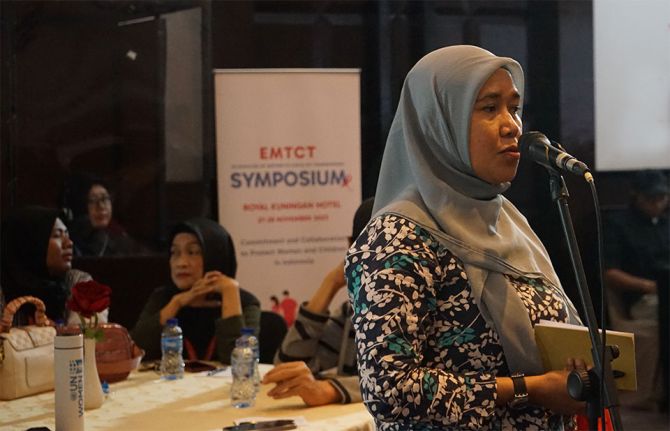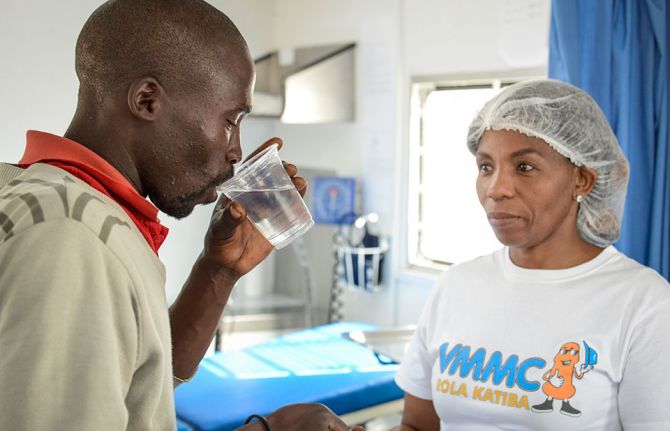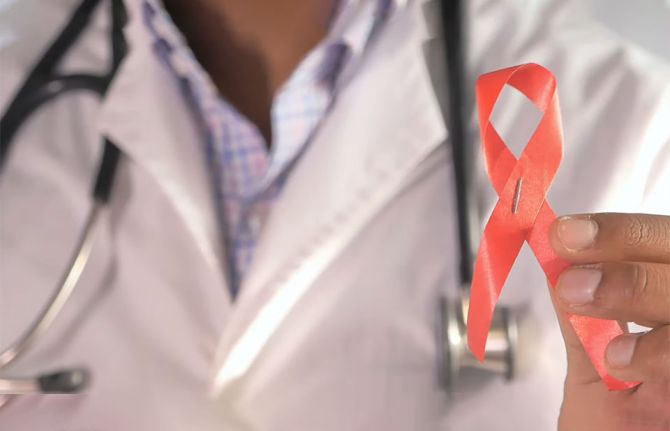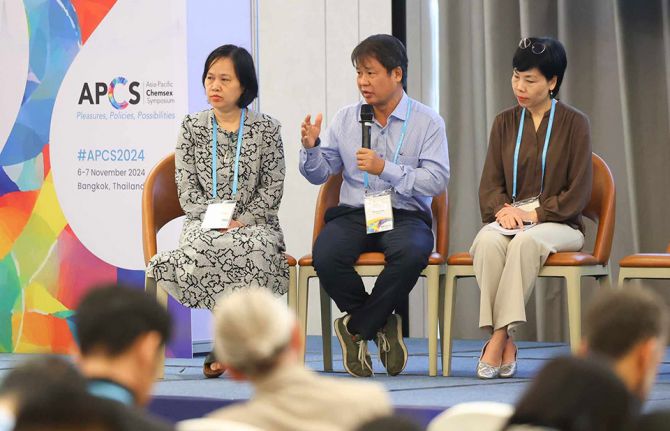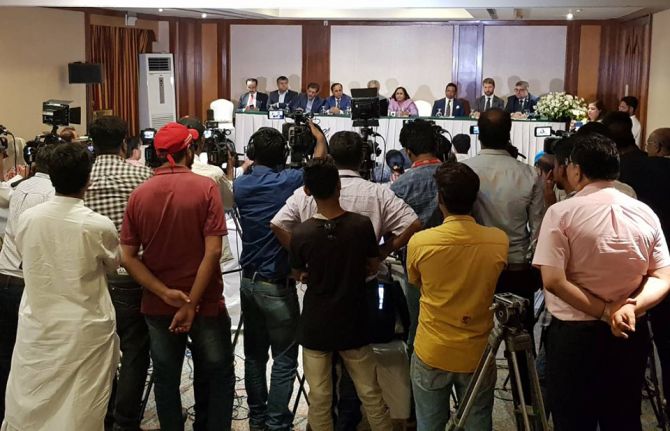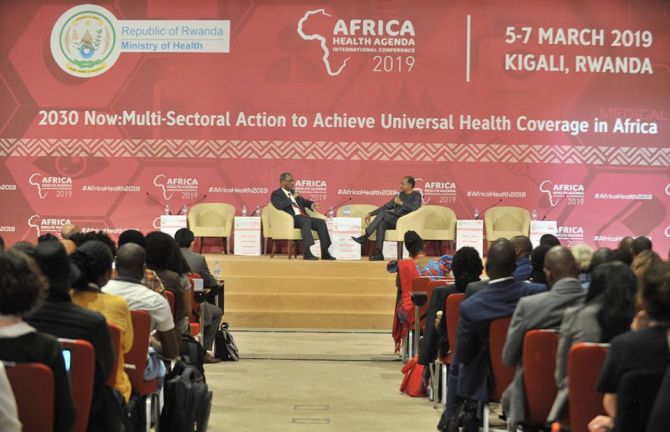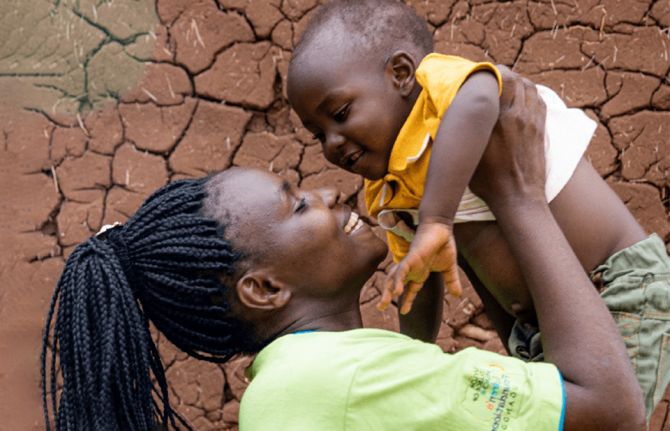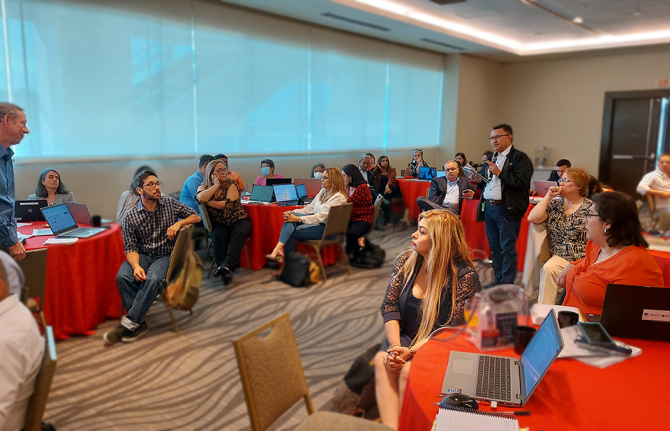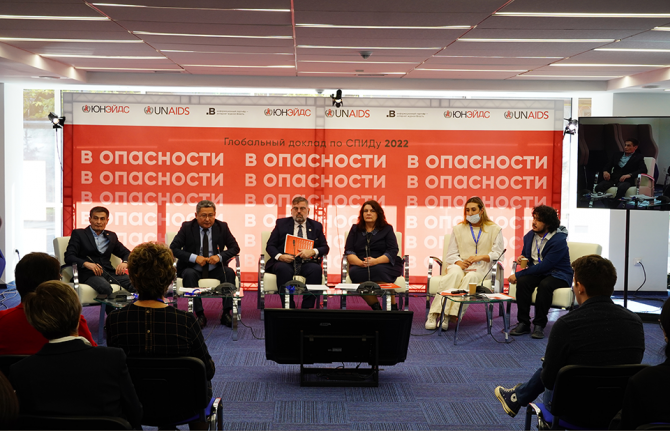
Feature Story
African nations celebrate 50th anniversary
20 May 2010
20 May 2010 20 May 2010 UNAIDS Executive Director Michel Sidibé (right) during the plenary session on human security issues in Africa. Yaoundé, 19 May 2010.
UNAIDS Executive Director Michel Sidibé (right) during the plenary session on human security issues in Africa. Yaoundé, 19 May 2010.The heads of seven African states are in Yaoundé at the invitation of Cameroon’s President Paul Biya to celebrate the 50th anniversary of their countries’ independence on Thursday. The seven leaders, who come mostly from central Africa, also took part in the closing ceremony of the international conference “Africa 21” on Wednesday evening.
The high-level conference, themed “Africa, a chance for the world: realities and challenges,” brought together many international leaders including Chairperson of the African Union Commission, Jean Ping, Secretary General of the Commonwealth, Ali Abdussalam Treki, two former French prime ministers, Michel Rocard and Alain Juppe, as well as former United Nations Secretary General Kofi Annan.
“Africa is a sleeping giant about to be awoken,” said Mr Annan, who then outlined how the region is increasingly becoming an active player on the world stage, participating actively in the G20 and in international climate talks in Copenhagen last December.
In today’s interconnected and interdependent world, countries recognize that domestic action alone can no longer assure the security of their people and economies, AIDS is one of the first examples in the modern era of how a transnational threat to human health has prompted a concerted response to global governance
UNAIDS Executive Director Michel Sidibé
UNAIDS Executive Director Michel Sidibé also participated in the closing ceremony and was the president of a plenary session on human security issues in Africa.
“In today’s interconnected and interdependent world, countries recognize that domestic action alone can no longer assure the security of their people and economies,” said Mr Sidibé, “AIDS is one of the first examples in the modern era of how a transnational threat to human health has prompted a concerted response to global governance.”
He stressed that if the impact of the epidemic on health and human security is not stopped, many African countries will be unable to adequately address any other development issue. To overcome the inroads HIV is making on the African continent he said AIDS must be taken out of isolation and called on international, national and community leaders to harness their political clout and resources to push for an end to AIDS.
Country visit

UNAIDS Executive Director Michel Sidibé and Cameroon’s First Lady Chantal Biya during his visit to the pan-African non-governmental organization “Synergies Africaines contre le SIDA et les souffrances” (African Synergies against AIDS and suffering). Yaoundé, 19 May 2010.
As part of his official visit to the country, Mr Sidibé was invited by Cameroon’s First Lady Chantal Biya to visit the pan-African non-governmental organization “Synergies Africaines contre le SIDA et les souffrances” (African Synergies against AIDS and suffering) where he also met the First Lady of Burkina Faso, Chantal Compoare. The NGO leverages the celebrity status of its 26 African First Ladies who are members and have as a mission improving the health of the African people. At the NGO, members of civil society expressed their hope for UNAIDS to support Cameroon in its bid to qualify for the Global Fund to Fight AIDS, Tuberculosis and Malaria’s Round 10 after the country’s unsuccessful proposal for previous round.
Mr Sidibé also visited First Lady Biya’s international research centre which is conducting research into an HIV vaccine as well as exploring resistance to antiretroviral therapy.
On Tuesday, Mr. Sidibé and Deputy Secretary-General of the United Nations, Dr. Asha-Rose Migiro discussed the challenges and national priorities on HIV with the United Nations country team in Cameroon. Later, they visited Yaoundé’s Sanitation Project (PADY) which is funded by the African Development Bank and implemented by the government of Cameroon. The project aims to alleviate the recurrent flooding in the city of Yaoundé and also reduce urban poverty. A PADY employee spoke about sensitization on HIV. The project provides voluntary counseling and testing on HIV and 50% of employees have undergone HIV tests.
African nations celebrate 50th anniversary
Speeches:
Multimedia:
Feature stories:
International conference begins in Cameroon (17 May 2010)
UNDP to partner with Sony and JICA in Cameroon and Ghana during FIFA World Cup (30 March 2010)
New wave of cooperatives in Cameroon help HIV-positive women gain economic independence (25 February 2010)
UNAIDS, Universal Postal Union, UNI Global Union and ILO launch global HIV prevention campaign (07 July 2009)
External links:

Feature Story
‘BORN HIV FREE’ campaign launched by The Global Fund
19 May 2010
19 May 2010 19 May 2010
Global Fund Ambassador, Carla Bruni-Sarkozy. Credit: Global Fund
The Global Fund to fight AIDS, Tuberculosis and Malaria has launched a new campaign BORN HIV FREE to mobilize public support for its work and contribute to the global effort for a world where no child is born with HIV by 2015. At the core of the campaign, originated and supported by Global Fund Ambassador, Carla Bruni-Sarkozy, is a series of creative films intended to inspire people to sign up online in support of The Global Fund’s mission.
Carla Bruni-Sarkozy’s support for the BORN HIV FREE campaign follows a call in 2009 from UNAIDS Executive Director Michel Sidibé to virtually eliminate mother-to-child transmission by 2015.
HIV-positive mothers can pass on HIV to their babies during pregnancy, child labour, delivery or by breast-feeding. The risk of transmission can be significantly reduced if they get access to HIV prevention and treatment services.
“It is heartbreaking that over 400,000 babies are born with HIV every year even though we have the medical means and the expertise to prevent this,” said Carla Bruni-Sarkozy, The Global Fund’s Ambassador for Protecting Women and Children against AIDS. “I hope the BORN HIV FREE campaign will inspire millions of people to support The Global Fund so we can finally put an end to this terrible injustice.”
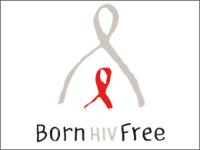
HIV-positive mothers can pass on HIV to their babies during pregnancy, child labour, delivery or by breast-feeding. The risk of transmission can be significantly reduced if they get access to HIV prevention and treatment services.
“We can win this battle against AIDS if we get the funding we require,” said Professor Michel Kazatchkine, Executive Director of The Global Fund. “This campaign is intended to encourage people to sign up in support of The Global Fund and to show their leaders that there is strong public support to continue and increase funding for its mission.”
The campaign will operate in several languages with short animation films aiming to expand public awareness that an HIV-free generation is possible within five years if governments continue funding the AIDS response. More information can also be found on the campaign’s web site (www.bornhivfree.org).
Since its establishment in 2002, The Global Fund has approved proposals totaling US$ 19.4 billion making it the main contributor to the health–related Millennium Development Goals. If current progress rates are maintained, it is possible to ensure that virtually no children anywhere in the world are born with HIV by 2015.
A majority of The Global Fund’s resources come from donor governments. This year countries will pledge funding for the next three years (2011-2013) to fight AIDS, Tuberculosis and Malaria. On 5 October 2010, UN Secretary-General Ban Ki-moon will chair a meeting of donor countries in New York. The BORN HIV FREE campaign will run until the key meeting in New York in order to mobilize public support for its work.
‘BORN HIV FREE’ campaign launched by The Global F
Partners:
Press centre:
UNAIDS calls for a virtual elimination of mother to child transmission of HIV by 2015 (21 May 2009)
Feature stories:
Global Fund projects that UNAIDS’ call for elimination of mother–to-child HIV transmission by 2015 is within reach (08 March 2010)
Global Fund: Elimination of HIV transmission from mother to child by 2015 within reach (08 March 2010)
Bruni-Sarkozy endorses UNAIDS call to virtually eliminate mother-to-child HIV transmission by 2015 (23 September 2009)
UNAIDS reaffirms its partnership with Global Fund as board meeting concludes (07 May 2009)
Call for fully funded Global Fund to fight AIDS, Tuberculosis and Malaria (31 March 2009)
External links:
Born HIV Free web site
Born HIV Free on YouTube
Born HIV Free on Twitter
Related

Feature Story
UNAIDS advances agenda for AIDS plus MDGs during 63rd World Health Assembly
18 May 2010
18 May 2010 18 May 2010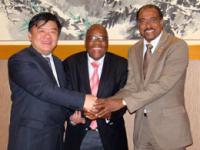
(L to R) Chen Zhu, Minister of Health of China, Aaron Motsoaledi, Minister of Health of South Africa and UNAIDS Executive Director Michel Sidibé. Credit: UNAIDS
In key bilateral meetings held on the eve of the 63rd World Health Assembly in Geneva, Michel Sidibé, Executive Director of UNAIDS engaged ministers of health from leading countries on how investments in AIDS can be used to leverage progress towards the other Millennium Develop Goals (MDGs).
During a meeting with Chen Zhu, Minister of Health of China, and Aaron Motsoaledi, Minister of Health of South Africa, Michel Sidibé cited these two countries as leading examples of the AIDS plus MDG agenda. “China and South Africa are leading examples of how national leadership on AIDS can accelerate broader goals for health and development.”
Michel Sidibé congratulated Minister Zhu for China’s recent decision to lift HIV-related travel restrictions prior to the opening of Expo 2010 in Shanghai. “Every individual should have equal access to freedom of movement,” said Michel Sidibé, UNAIDS Executive Director. “This is a powerful signal that foreigners who wish to visit, work and live in China are welcome—regardless of their HIV status.”
Michel Sidibé also praised Minister Motsoaledi for South Africa’s leadership in response to HIV. “With the launch of the National HIV Counselling and Testing Campaign, South Africa has launched the world’s largest AIDS initiative that integrates HIV with larger public health goals.” said Sidibé. On 25 April, South Africa’s President Zuma launched South Africa’s National HIV Counselling and Testing Campaign, which aims to voluntarily test 15 million South Africans for HIV in coming months. According to Minister Motsoaledi, “the HIV Counselling & Testing campaign also offers people taking HIV tests the incentive of free screening for hypertension, blood sugar levels, haemoglobin, TB and cervical cancer.”
UNAIDS is collaborating with China and South Africa on the development of the ‘AIDS plus MDG agenda,’ which aims to position the AIDS movement as a force for accelerating progress towards the MDGs. UNAIDS is developing plans for a high-level side event on AIDS plus MDGs during the UN Summit on the Millennium Development Goals in September 2010 that will be co-hosted by the Governments of China and South Africa.
In another meeting, Michel Sidibé met with Dr Jose Gomes Temporao, Minister of Health of Brazil. Brazil is recognized by UNAIDS for having been one of the first countries to achieve universal access to treatment. “Brazil is a model to other countries in its national response to AIDS,” said Michel Sidibé. “Brazil has also demonstrated how AIDS has strengthen the national health system, and the fight for equality and human rights.” Mr Sidibé and Dr Temporao also discussed how Brazil has used HIV to advance the use of trade-related aspects of intellectual property rights (TRIPS) to increase access to essential health commodities. They also agreed feature the results of a 10-year assessment of the Doha Declaration on TRIPS and Public Health and HIV in Brazil later this year.
UNAIDS advances agenda for AIDS plus MDGs during
Cosponsors:
World Health Organization (WHO)
Feature stories:
Sixty-second World Health Assembly to be dominated by A(H1N1) (18 May 2009)
Publications:
Joint action for results: UNAIDS outcome framework, 2009 – 2011 (pdf, 931 Kb.)

Feature Story
International Day Against Homophobia
17 May 2010
17 May 2010 17 May 2010
May 17 is the International Day Against Homophobia. Homophobia is considered one of the main obstacles in implementing HIV prevention strategies. Of the 192 member states of the United Nations, 85 have laws that still criminalize homosexual behaviour and, in some of these countries, conviction can even result in the death penalty.
Speaking on the occasion, UNAIDS Executive Director Michel Sidibé said, “I urge all governments to take steps to eliminate stigma and discrimination faced by men who have sex with men, lesbians and transgender populations. They must also create social and legal environments that ensure respect for human rights and enable universal access to HIV prevention, treatment, care and support.”
Video message from UNAIDS Executive Director
At least 5-10% of HIV infections worldwide are estimated to occur through sex between men, though this figure varies considerably between countries and regions. Yet men who have sex with men continue to face discrimination from healthcare workers, other service providers, employers and the police. Discrimination prevents men who have sex with men from disclosing their sexual orientation, or reporting for HIV services. Consequently their vulnerability to infection is increased, and national data do not reflect the size of the HIV epidemic that is linked to same-sex behaviour involving men.
I urge all governments to take steps to eliminate stigma and discrimination faced by men who have sex with men, lesbians and transgender populations .
Michel Sidibé, UNAIDS Executive Director
Removing punitive laws, policies, practices, stigma and discrimination that block effective responses to AIDS is one of UNAIDS’ 10 priority areas in the Joint Outcome Framework for 2009-2011. Another key priority of the Framework is also to empower men who have sex with men, sex workers and transgender people to protect themselves from HIV infection and to fully access antiretroviral therapy.
The 2001 UN General Assembly Special Session (UNGASS) Declaration of Commitment on HIV/ AIDS adopted by all UN Member States emphasized the importance of “addressing the needs of those at the greatest risk of, and most vulnerable to, new infection as indicated by such factors as […] sexual practices.” In the 2006 United Nations Political Declaration on HIV/AIDS, governments committed to removing legal barriers and passing laws to protect vulnerable populations.
Many governments have not acknowledged that sex between men happens and that unprotected anal sex contributes to the transmission of HIV. Often if recognized, there is insufficient political will, funding and programming to address it.
The Global Fund is fully committed to addressing inequities for the benefit of MSM and transgender communities and broader populations
Michel Kazatchkine, Executive Director of the Global Fund to Fight AIDS, Tuberculosis and Malaria
“Homophobia and transphobia drive significant parts of HIV epidemics underground in all regions of the world. Only around one in 10 MSM and transgender people have access to HIV prevention services", said Michel Kazatchkine, Executive Director of the Global Fund to Fight AIDS, Tuberculosis and Malaria. “The Global Fund is fully committed to addressing these inequities for the benefit of MSM and transgender communities and broader populations”.
UNAIDS hosted an event at its headquarters in Geneva that included the screening of a short video on homophobia in Jamaica and how it impacts people, titled A Deadly Cycle and a film Translatina, a full-length documentary that offers a realistic look at the challenges faced by transgender people in accessing education, work, justice, health care, and other services in Latin America.
Also on the agenda were discussions by Frank Mugisha, Executive Director, Sexual Minorities of Uganda; LGBT rights activist Ashok Row Kavi, who is also Technical Officer, Sexual Minorities, UNAIDS country office for India; and Dr Gottfried Hirnschall, WHO HIV director.
In 1990, the World Health Assembly approved the 10th Edition of the International Classification of Diseases (World Health Organization) on May 17, which established that sexual orientation (heterosexual, bisexual or homosexual), on its own, would no longer “be considered as a disorder”. For this reason May 17 is used to mark the International Day against Homophobia.
International Day Against Homophobia
Key populations:
Men who have sex with men
People in prison settings
Uniformed services
Cosponsors:
WHO
UNDP International Day against homophobia and transphobia
Press centre:
Read statement by UNAIDS Executive Director
Multimedia:
Video message from UNAIDS Executive Director
Feature stories:
Punitive laws limit access to HIV prevention and care services in Asia Pacific (21 May 2009)
Anti-homophobia campaign to end discrimination in Latin America (16 May 2009)
El Salvador: Ministerial decree to reduce homophobia in health services (03 April 2009)
HIV prevention hampered by homophobia (13 January 2009)
External links:
Publications:
Reducing HIV stigma and discrimination: a critical part of national AIDS programmes - a resource for national stakeholders in the HIV response (pdf, 1.07 Mb.)
Related

Feature Story
World Health Assembly to discuss International Health Regulations and MDG
17 May 2010
17 May 2010 17 May 2010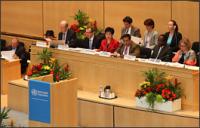
Credit: WHO/Jesse Hoffmann
The 63rd World Health Assembly, the gathering of the decision-making body of World Health Organization (WHO), opened in Geneva today. Health Ministers and officials from across the world will meet until 21 May 2010 to discuss the implementation of the International Health Regulations (IHR).
There are 194 countries across the globe, including all the member states of the World Health Organization (WHO) who are State Parties to the IHR, a binding, international legal instrument. The aim of these global rules is to help the international community prevent and respond to acute public health risks that have the potential to cross borders and threaten people worldwide.
The IHR, for example, require countries to report certain disease outbreaks and public health events to WHO and also to strengthen their existing capacities for public health surveillance and response.
This year’s World Health Assembly will also focus on monitoring the achievements of the health-related Millennium Development Goals. In the year 2000, 189 countries committed their nations to a new global partnership to reduce extreme poverty. They set out a series of targets to be reached by 2015. These have become known as the Millennium Development Goals (MDGs) and include halving extreme poverty, halting the spread of HIV and providing universal primary education.
The World Health Assembly is attended by delegations from all WHO member states yearly to focus on specific health agenda. Last year’s Assembly focused considerable attention on the widespread outbreak of influenza A (H1N1) and the most effective responses to the potential pandemic, including preparedness, access to vaccines and sharing of influenza viruses.
World Health Assembly to discuss International He
Cosponsors:
World Health Organization (WHO)
Feature stories:
UNAIDS calls for a virtual elimination of mother to child transmission of HIV by 2015 (21 May 2009)
Sixty-second World Health Assembly to be dominated by A(H1N1) (18 May 2009)
Publications:
Joint action for results: UNAIDS outcome framework, 2009 – 2011 (pdf, 931 Kb.)

Feature Story
International conference begins in Cameroon
17 May 2010
17 May 2010 17 May 2010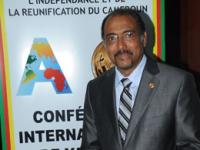
UNAIDS Executive Director Michel Sidibé attended a high-level international conference, Africa 21 in Yaoundé, Cameroon.
The African continent is experiencing major changes as 17 African countries prepare to celebrate the fiftieth anniversary of their independence in Yaoundé, Cameroon. Two days before the anniversary celebrations, a high-level international conference, Africa 21 began on Tuesday in Yaoundé. The conference is called “Africa, a chance for the world: realities and challenges,” and brings together top politicians, economists, international civil servants and business leaders, including former United Nations Secretaries of State, Kofi Annan and Boutros Boutros-Ghali. Much of the debate will focus on macro-economic issues.
Executive Director of UNAIDS Michel Sidibé will participate in the conference’s plenary session on security issues on Wednesday.
As an African I am proud to take part in events marking the rebirth of this continent. There is so much potential and promise here.
Michel Sidibé, UNAIDS Executive Director
“As an African I am proud to take part in events marking the rebirth of this continent,” said Mr Sidibé. “There is so much potential and promise here,”
Mr Sidibé began his three-day working trip to Cameroon on Monday. Aside from attending “Africa 21,” he will meet with the President of Cameroon, Paul Biya. He will also make a joint field visit with Deputy Secretary-General of the United Nations, Dr. Asha-Rose Migiro and Executive Secretary of the Economic Commission for Africa, Abdoulie Janneh. They will visit an urban renewal project in Yaoundé, which is financed by the African Development Bank, the International Labour Organization and the government of Cameroon.
Mr. Sidibé will also visit Yaoundè’s central hospital, which has a major HIV treatment centre and meet with people living with HIV. He will tour the International Research Centre, Chantal Biya, which aims to develop research into vaccines and treatment into major diseases challenging Africa, particularly HIV, tuberculosis and malaria. One of the highlights of Mr. Sidibé’s visit is his meeting with leaders of civil society and people living with HIV.
Cameroon has a generalised HIV epidemic with a prevalence of 5.5% in adults aged 15-49 years old. Cameroon has led the way in decentralizing its AIDS response. Now almost all health districts are equipped to manage mother-to-child HIV transmission. Around 46% of people with an advanced stage of HIV infection were receiving antiretroviral therapy in 2009 compared to 39% in 2008.
International conference begins in Cameroon
Cosponsors:
Multimedia:
Feature stories:
UNDP to partner with Sony and JICA in Cameroon and Ghana during FIFA World Cup (30 March 2010)
New wave of cooperatives in Cameroon help HIV-positive women gain economic independence (25 February 2010)
UNAIDS, Universal Postal Union, UNI Global Union and ILO launch global HIV prevention campaign (07 July 2009)

Feature Story
President Kabila commits to ensuring an AIDS-free generation in Democratic Republic of Congo
11 May 2010
11 May 2010 11 May 2010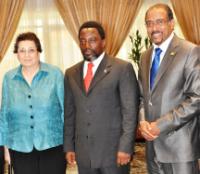 (from left) Thoraya Ahmed Obaid, UNFPA’s Executive Director; President Joseph Kabila of the Democratic Republic of the Congo; and Michel Sidibé, UNAIDS’ Executive Director. 10 May 2010 Credit: UNFPA
(from left) Thoraya Ahmed Obaid, UNFPA’s Executive Director; President Joseph Kabila of the Democratic Republic of the Congo; and Michel Sidibé, UNAIDS’ Executive Director. 10 May 2010 Credit: UNFPAPresident Joseph Kabila of the Democratic Republic of the Congo has pledged to promote the emergence an AIDS-Free Generation, to ensure safer motherhood and to eliminate mother-child-transmission of HIV in his country.
“These are priorities for the women and children of my country,” President Kabila said as he received a joint mission to his nation by Thoraya Ahmed Obaid, UNFPA’s Executive Director, and Michel Sidibé, UNAIDS’ Executive Director.
“I will lead in ensuring an AIDS-Free Generation in DRC,” the President added, expressing his commitment to launch a national initiative to reverse the AIDS epidemic.
The Executive Directors thanked President Kabila for his readiness to make safe motherhood and an AIDS-Free Generation priorities not only in his country, but also in the Southern African Development Community (SADC) and the African Union.
UNFPA’s Ms. Obaid highlighted the links between women’s health, reproductive health and HIV: “By integrating HIV services for maternal and child health with general sexual and reproductive health, the Democratic Republic of the Congo will reap great benefits for the health system.” She urged the country to seize the opportunity offered by the Campaign for the Accelerated Reduction of Maternal Mortality in Africa (CARMMA) to launch the President’s initiative for an AIDS-Free Generation.
Mr. President – you have the unique opportunity to restore the health and dignity of mothers, sisters and daughters in DRC and beyond.
Michel Sidibé, Executive Director of UNAIDS
UNAIDS’ Mr. Sidibé welcomed President Kabila’s decision to use his leadership as Chair of the SADC to rally his peers across Africa to support this urgent agenda. “Mr. President – you have the unique opportunity to restore the health and dignity of mothers, sisters and daughters in DRC and beyond.”
The Executive Directors stressed the need to take AIDS out of isolation and integrate it with related health interventions for the most effective outcomes. They called the virtual elimination of mother-to-child transmission by 2015 a concrete but achievable goal.
Currently, more than 40,000 infants are born with HIV infection every year in the Democratic Republic of the Congo. Only 2 per cent of pregnant women have access to services to prevent mother-to-child transmission, and only 8 per cent of pregnant of women are offered HIV testing and counselling.
The Democratic Republic of the Congo is one of the six countries in the world that together account for 50 per cent of the world’s maternal deaths. Each hour, maternal death takes the lives of about four women.
During their joint mission, the Executive Directors are also scheduled to meet with the Prime Minister, other Government officials, parliamentarians and civil society representatives, including people living with HIV.
President Kabila commits to ensuring an AIDS-free
Cosponsors:

Feature Story
Cricketers promote HIV awareness during ICC World Twenty20
07 May 2010
07 May 2010 07 May 2010
High-profile cricketers including Graeme Smith, Kumar Sangakkara, Mahendra Singh Dhoni and Stafanie Taylor team took time out from the Twenty20 World Cup being held at Barbados to help support cricket’s global response to HIV.
A series of community activities have been organized during the tournament by the Think Wise partnership. While Sri Lanka’s captain Sangakkara visited a school in Barbados to deliver an HIV prevention session, the Indian team hosted community groups and carried out cricket training sessions.
The South African squad invited a group of children aged 12-15 to visit a training session followed by a 15-minute question and answer session with skipper Smith. The children then showcased their cricketing skills to Rob Walter, the South Africa fitness trainer.
Stafanie Taylor and Stacy-Ann King, both of the West Indies women's cricket team, visited Project Viola in St Kitts which aims to provide services and support to teen mothers in school.
Think Wise, a partnership programme between UNAIDS, the International Cricket Council, UNICEF and the Global Media AIDS Initiative, was established to use the power of cricket to help tackle key issues around AIDS and encourage informed decision making by children and young adults.
The advocacy work carried out by the partnership and leading international cricketers delivers key information about HIV through public service announcements, event publications and online at international, regional and national levels. The partnership also provides information resources to young people and volunteers, coaches, as well as commentators and broadcasters about the AIDS epidemic.
Talking about the campaign, Graeme Smith said, “As a Think Wise Champion, I believe that it is very important to use my profile to encourage young people to protect themselves from HIV.
“By having the chance to meet young people from the region, I have been able to understand the important work that organizations such as UNAIDS and UNICEF, working with local agencies, do in providing young people with education on HIV in the Caribbean,” he added.
UNICEF Representative for Barbados and the Eastern Caribbean, Tom Olsen, added: “We are extremely proud of this partnership and value it highly. We talk a lot of sports for development and know the value of using sports to effect positive behavioural change."
Sri Lankan skipper Sangakkara said, “Hopefully more players and umpires will join in with this project in the future so we can continue to spread the word.”
A Caribbean Broadcast Media Partnership on HIV/AIDS public service announcement campaign, featuring Taylor alongside other leading Caribbean celebrities, is also being played on the big screen at matches and by CBMP broadcasters across the region.
Tickets have been donated to local community groups who run HIV prevention programmes, umpires are wearing Think Wise logos on their shirts and players in the semi-finals and the final on May 16 will wear red ribbons as a show of support for people living with HIV.
The partnership between UNAIDS and ICC began in September 2003 when they first teamed up to bring messages of HIV prevention to young people across cricket playing nations. In 2006 UNICEF also joined the partnership which now also supports the “Unite for Children, Unite against AIDS” campaign.
Cricketers promote HIV awareness during ICC World
Key population:
Cosponsors:
Multimedia:
View video by Sri Lanka captain Kumar Sangakkara
Feature stories:
Cricket stars launch global AIDS campaign (04 June 2009)
West Indies cricketer Ramnaresh Sarwan new champion for HIV advocacy (27 April 2010)
External links:
Publications:
The Cricket HIV and AIDS Curriculum (pdf, 1.16 Mb.)

Feature Story
Christian faith leaders launch alliance to respond to AIDS in PNG
07 May 2010
07 May 2010 07 May 2010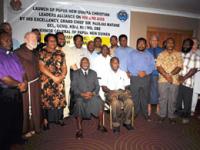 His Excellency the Governor General of PNG, Grand Chief, Sir Paulius Matane (seated left) and the Head of the Roman Catholic Church in PNG and Chair of the Alliance, Archbishop John Ribat (seated right) with the Church Leaders who signed the statement of commitment. 05 May 2010, PNG.
His Excellency the Governor General of PNG, Grand Chief, Sir Paulius Matane (seated left) and the Head of the Roman Catholic Church in PNG and Chair of the Alliance, Archbishop John Ribat (seated right) with the Church Leaders who signed the statement of commitment. 05 May 2010, PNG.Church leaders from 19 Christian denominations in Papua New Guinea (PNG) came together to launch the Christian Leaders Alliance, a network of Christian faith leaders committed to provide an effective response to AIDS in the country. Civil Society, including people living with HIV, Faith based groups, donors and partners in the national response attended the event.
“This is a turning point in the national AIDS response. Having Christian Leaders to jointly come together in addressing AIDS is a major breakthrough, a source of inspiration to all of us in the AIDS community in Papua New Guinea,” said UNAIDS Country Coordinator Tim Rwabuhemba.
During the launch, faith leaders signed a Statement of Commitment to represent their promise in reversing the epidemic in the country. The statement enumerates the ways in which the Christian church can make a lasting difference in helping the country to overcome the epidemic.
This is a turning point in the national AIDS response. Having Christian Leaders to jointly come together in addressing AIDS is a major breakthrough, a source of inspiration to all of us in the AIDS community in Papua New Guinea.
UNAIDS Country Coordinator Tim Rwabuhemba
“The launch and the signing of the statement of commitment is a historic event of great magnitude” said His Excellency the Governor General of PNG, Grand Chief, Sir Paulius Matane in his keynote address while launching the Alliance. Sir Paulius Matane commended the church leaders for taking “bold, strong and courageous steps needed against a formidable adversary such as HIV.”
The new alliance aims to share knowledge, understanding and experience from the various communities to unite efforts for a more effective and inclusive response to AIDS. Through the signing of the agreement, faith leaders seek to establish a new culture of ecumenical cooperation, respecting the uniqueness of their traditions while focusing on shared values of human dignity and human rights.
Faith leaders committed, among other things, to address social, religious, cultural and political norms and practices that perpetuate stigma and discrimination. To that end, they agreed to utilize existing infrastructure and communication networks within their religious communities to disseminate accurate HIV information in the areas of prevention, treatment, care and support.
“We pledge to do more. We will spare no effort to break the silence around HIV,” said the Head of the Roman Catholic Church in PNG and Chair of the Alliance, Archbishop John Ribat.
Sir Peter Barter, Chairperson National AIDS Council, noted that the churches of Papua New Guinea were the stakeholders with the “biggest potential for preventing the spread of HIV in the country. This is because the churches have gained the trust and confidence of affected communities.”
Papua New Guinea makes up the largest share of HIV cases in the Pacific region, growing exponentially from 21% in 1984–1989 to over 99% in 2008. Reported cases in Papua New Guinea total 28,294 but UNAIDS estimates there are 54,000 people living with HIV. It is estimated that by 2012, Papua New Guinea will have a national prevalence rate of 5.07% and a total of 208,714 people will have been infected with HIV.
Christian faith leaders launch alliance to respon
Feature stories:
Papua New Guinea launch of the Commission on AIDS in the Pacific (11 March 2010)
Publications:
Turning the Tide: An OPEN strategy for a response to AIDS in the Pacific (pdf, 1.52 Mb.)

Feature Story
World Bank opens free access to development data
06 May 2010
06 May 2010 06 May 2010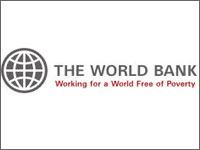 The World Bank has made its extensive store of developmental data available to all free of charge.
The World Bank has made its extensive store of developmental data available to all free of charge.In an unprecedented move, the World Bank has made its extensive store of developmental data available to all free of charge. From now on more than two thousand health, economic, human development, financial and business statistics will be accessible via a new website, data.worldbank.org. In the past such information has generally only been available to paying subscribers.
The decision is part of the World Bank’s broader effort to increase access to information and it hopes that a varied range of users, from researchers to journalists and from entrepreneurs to school children will draw on this new resource, available in Arabic, English, French and Spanish.
The Bank hopes to reach new audiences and foster a greater commitment to development issues. In order to distribute its information as widely as possible, it has also partnered with Google to make nearly 40 development indicators more accessible via the search engine.
“It’s important to make the data and knowledge of the World Bank available to everyone," said World Bank President Robert B. Zoellick. "Statistics tell the story of people in developing and emerging countries and can play an important part in helping to overcome poverty.”
The Bank is keen to see this initiative stimulate discussion, increase demand for data and lead to more evidence-based policymaking in areas such as poverty alleviation and achieving the millennium development goals. It can also provide an avenue for encouraging more individuals to turn their attention toward development.
According to Aleem Walji, manager of the World Bank Institute's new Innovation Practice, "Free and open access to data will empower citizens to get more directly involved in the development process."
Designed to be simple to navigate, user friendly and interactive, the website holds data from more than 200 countries and those visiting will be able to download entire datasets for any given country. The information comes from a variety of sources including the Bank’s 186 member states, partners in both the public and private sectors and more than 30 international agencies. The site uses data from a number of fellow United Nations organisations and the extensive health section, for example, draws on information from UNAIDS, the United Nations Population Division, the World Health Organization and the United Nations Children's Fund, among other sources.
The agency’s new open data policy has been welcomed by researchers and development professionals. Sabina Alkire, director of the Oxford Poverty and Human Development Initiative, said she hoped that the move will mean more frequently updated poverty data and increased innovation.
"The more that people can have access to the data, the more they can really interact with it, think about it, digest it, and experiment with it. That has very good independent value, because in effect by doing so you’re releasing the creativity of many minds, to be able to create and innovate, experiment with the data, and see if they can come up with a more interesting analysis."
World Bank opens free access to development data
Related
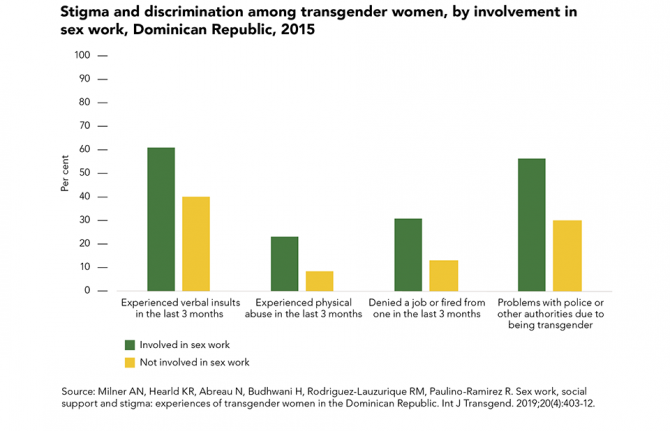 Transgender sex workers face frequent abuse
Transgender sex workers face frequent abuse

29 March 2022



